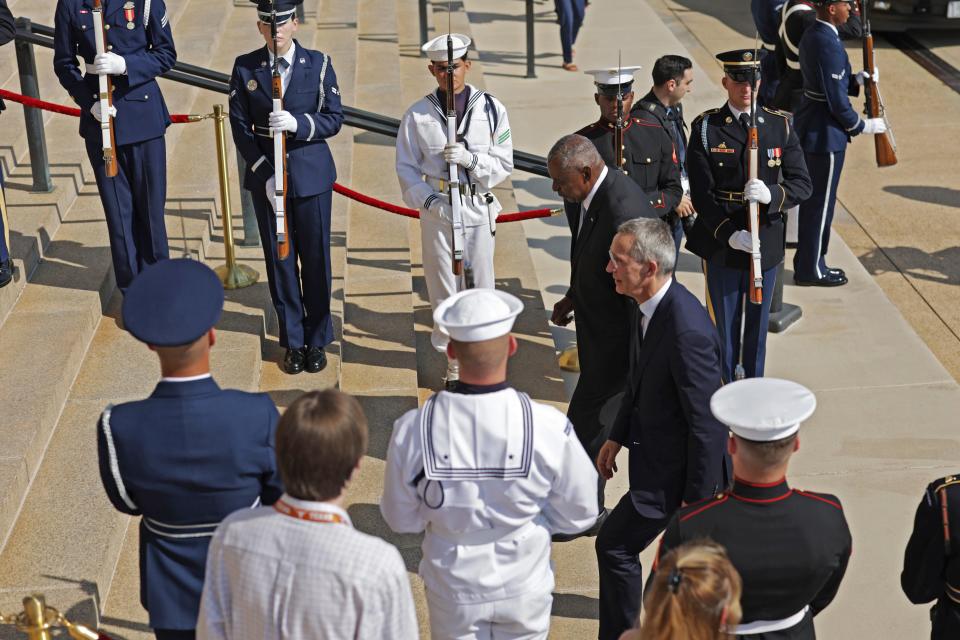How dangerous are China and Russia? Threats grow as NATO leaders meet in Washington.
As NATO opens its 75th anniversary summit on Tuesday in Washington, D.C., Americans should understand that their friends in Europe are afraid, owing to two years into war in Ukraine, more nuclear threats from Russian President Vladimir Putin, and an emerging alliance of Russia, China, Iran and North Korea targeting an America distracted by a vicious presidential election and bitter partisanship.
Our European allies are looking for a sign of strong American leadership, not just rhetoric. The recently passed National Defense Authorization Act from the Senate Armed Services Committee provides just that opportunity, but only if it is reinforced with an even stronger bipartisan appropriation.
It’s no secret to our adversaries or our allies in NATO and East Asia that America’s global interests, strategies and defense capabilities are badly out of balance. They see our brave rhetoric vis-à-vis China while our Navy shrinks and ships sail without full crews. They see our shrinking Army forces swinging back-to-back from Europe to exercises to training with old equipment, struggling to grasp and implement the lessons emerging from Ukraine. They see exhausted soldiers and families. They hear reports of Air Force aircraft older than their crews or retired early because they cannot afford to be maintained. They feel the heat of Russian nuclear modernization without an American answer.
Chinese President Xi Jinping put it clearly as he bade farewell to Putin in Moscow last year: “Changes the likes of which we haven’t seen for 100 years, and we are the ones driving these changes.” By that, he meant that he could see American weakness, a crumbling of American influence and a new set of institutions capable of smothering the hopes of billions for democracy and freedom, which American leadership has powered.
To these men, democracy is a disease, a virus to be stamped out. And after two decades of inconclusive American involvement in Iraq and Afghanistan and a decade of partisan-driven constraints on the U.S. defense budget, they might well believe that the United States is no longer “the arsenal of democracy.”
Threats against US are larger and more powerful than in the Cold War

The fiscal year 2025 National Defense Authorization Act makes a good start toward addressing our weakness by coming in at $25 billion above the Biden administration’s budget request. But in every program, more is needed, not just in a one-time plus up, but over at least a five-year period, with commitments perhaps doubling as a percentage of gross domestic product.
Sounds like too much? In the Cold War, America had only the Soviet Union to deter, while today we face larger and more powerful adversaries across a much broader front.
As Russia threatens to put nuclear weapons in space, do we have the necessary means to deter or, if necessary, defend against these? Can we protect the American people from serious Chinese, Russian and Iranian threats to destroy America’s electric power grid and leave hundreds of millions without power?
Beijing-Moscow-Iran-North Korea axis: Here's what's at stake in the war against Russia
Russia has upped its forces against Ukraine from 200,000 to 500,000 in two years: If Ukraine falls, will a couple of forward deployed U.S. brigades with maybe 200 tanks be sufficient to prevent a wider war in Europe?
Will China be seriously intimidated by two U.S. aircraft carriers, a handful of long-range bombers and only dozens of anti-ship missiles, when it can muster more than 10 times the ships and aircraft along with some 1,500 missiles against U.S. forces in the Western Pacific, and at the same time hold the United States at risk with its own nuclear arsenal?
Can we block Iran’s terrorists and aggression when it declares itself a nuclear weapons state? And amid all of this, could we reinforce South Korea against a nuclear-armed Kim Jong Un at the same time?
Opinion alerts: Get columns from your favorite columnists + expert analysis on top issues, delivered straight to your device through the USA TODAY app. Don't have the app? Download it for free from your app store.
Today the answer to these questions is clearly, “No!” But this is the world fast approaching, with serious consequences for the United States.
It’s time to end the “peace dividend” of the 1990s and recognize that innovative sanctions, skilled diplomacy and allies' unity at summits cannot substitute for putting more hard power resources to work.
Hell on earth: I reported from the war in Ukraine. What I witnessed still haunts me.
US needs to protect peace through strength
Mississippi Sen. Roger Wicker, the leading Republican on the Senate Armed Services Committee, has given us a farsighted vision of what we must do in his recently published study, "21st Century Peace Through Strength." As he sees it, we need an immediate addition of about $55 billion this year (the Armed Services Committee passed $25 billion) and a ramp-up of the defense budget to approximately 5% of GDP over the next five years.
This would enable us to replace aging defense infrastructure and incorporate new technologies and lessons learned from Ukraine into new platforms in an expanded military.
Should US draft men or women? Making compensation more competitive with civilian careers is crucial
In page after page of stark analysis, Sen. Wicker examines each of the services and commands and calls for specific actions to provide the deterrent we need. An enlarged shipbuilding program, replacement of obsolescent Army systems and platforms, and greater investments in space and cyber are just a few of dozens of requirements, as he sees it.
We also require a serious look at the all-volunteer force and Army force structure if we are to deter Russian aggression beyond Ukraine.

We are at a pivotal moment in American national security. Will we withdraw from our commitments in Europe and Asia to allow others to shape the institutions inimical to American interests, continue to articulate a strategy that relies on overstretched and aging forces that will shatter in a crisis, or determine that now is the time to reinvest in our national security to deter increasingly hostile potential adversaries?
Both houses of Congress and the American people should give immediate and positive attention to Sen. Wicker’s proposal. One of the oldest maxims of diplomacy is this: To maintain peace, prepare for war. This is that moment.
Retired Gen. Wesley K. Clark is a former NATO Supreme Allied Commander, Europe and the founder of Renew America Together.
You can read diverse opinions from our USA TODAY columnists and other writers on the Opinion front page, on X, formerly Twitter, @usatodayopinion and in our Opinion newsletter.
This article originally appeared on USA TODAY: NATO summit starts as Russia, China threats against US grow


